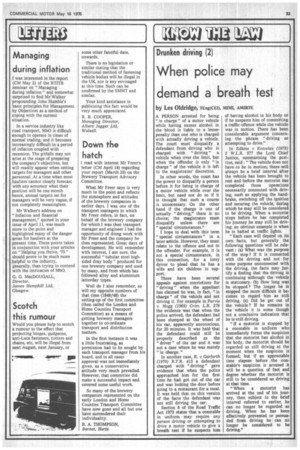Drunken driving (2)
Page 35

If you've noticed an error in this article please click here to report it so we can fix it.
When police may demand a breath test
by Les Oldridge, TEng(CEI), MIMI, AMIRTE
A PERSON arrested for being " in charge' of a motor vehicle while having excess alcohol in the blood is liable to a lesser penalty than one who is .charged with actually driving a vehicle. The court must disqualify a defendant from driving who is charged with " driving " a vehicle when over the limit, but when the offender is only "in charge " of the vehicle it is left to the magistrates' discretion.
In other words, the court has the power to disqualify a person before it for being in charge of a motor vehicle while over the limit, 'but need not do so if it is thought that such a course is unnecessary. On the other hand if the charge is one of actually "driving," there is no choice; the magistrates must disqualify unless there are "special circumstances."
I hope to deal with this term "special circumstances" in a later article. However, they must relate to the offence and not to the offender. For example, it is not a special circumstance, in this connection, for a lorry driver to plead that he has a Wife and six children to support.
There have been several appeals against convictions for " driving " when the appellant has claimed he was, in fact, "in charge" of the vehicle and not driving it. For example in Purvis v. Hogg (1969) Crim. L.R. 378 the evidence was that when the police arrived, the defendant had been slumped at the wheel of his oar, apparently unconscious, for 20 minutes. It was held that the defendant could still be properly described as the "
driver" of the car and it was not a case where he was merely "in charge. "
In another case, R. v Garforth (1970) R.T.R. 415 a defendant charged with " driving " gave evidence that when the police approached him for the first time be had got out of the car and was locking the door before going to a restaurant for a meal. It was held that on this version of the facts the defendant was not still driving the car.
Section 8 of :the Road Traffic Act 1972 states 'that a constable in uniform may require any person driving or attempting to drive a motor vehicle to give a breath test if he suspects him
of having alcohol in his body or if he suspects him of committing a traffic offence while .the vehicle was in motion. There has been considerable argument concerning the phrase "driving or attempting to drive."
In Edhins v Knowles (1973) 2 W.L.R. 977 the Lord Chief Justice, summarising the position, said : "The vehicle does not have to be in motion; there will always be a brief interval after the vehicle has been brought to rest and before the motorist has completed those operations necessarily connected with driving, such as applying the handbrake, switching off the ignition and securing the vehicle, during which he may still be considered to be driving. When a motorist stops before be has completed his journey he may still be driving; an obvious example is when he 'is halted at traffic lights.
"Each case will depend on its own facts, but generally the following questions will be relevant : (a) What was the purpose of the stop ? If it is connected with the driving and not for some purpose unconnected with the driving, the facts may justify a finding that the driving is continuing although the vehicle is stationary. (b) How long was he 'stopped ? The longer 'he is stopped the more difficult it becomes to regard 'him as still driving. (c) Did he get out of the vehicle ? If he remains in the vehicle it is some though not a conclusive indication that he is still driving.
"If a motorist is stopped by a constable in uniform who immediately forms the suspicion that the motorist has alcohol in his body, the motorist should be regarded as still driving at the moment when the suspicion is formed; but if an appreciable time elapses before the constable's suspicion is aroused it will be a question of fact and degree whether the motorist is still to be considered as driving at that time.
" When a 'motorist has arrived at the end of his journey, then subject to the 'brief interval referred to earlier, he can no longer be regarded as driving. When he has been effectively prevented or persuaded from driving he can no longer be considered to be driving."




























































































